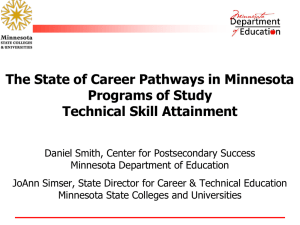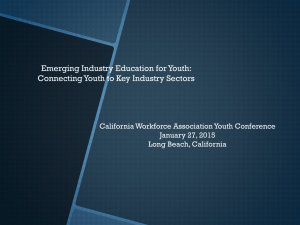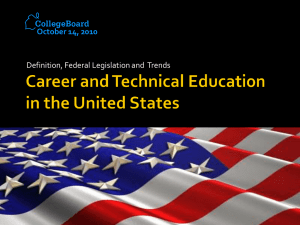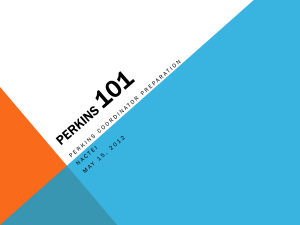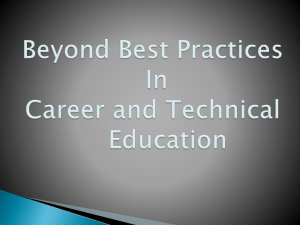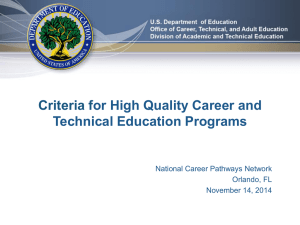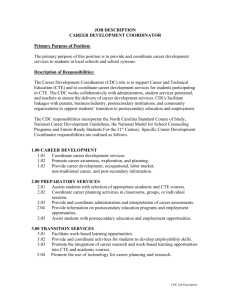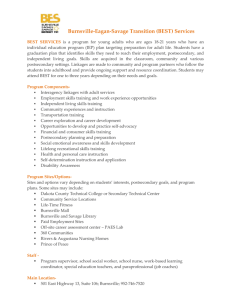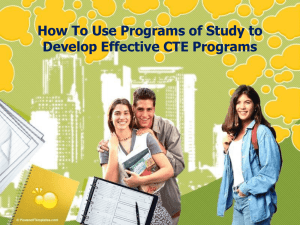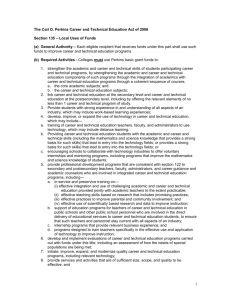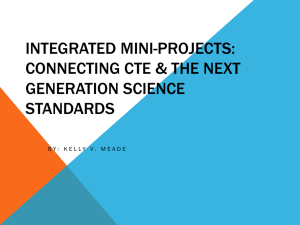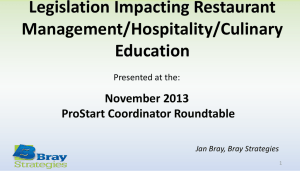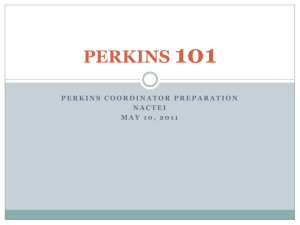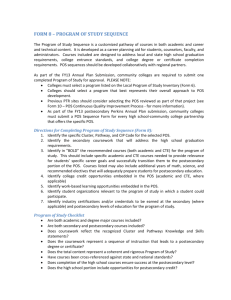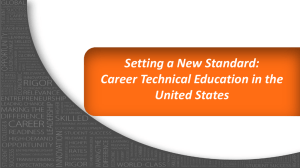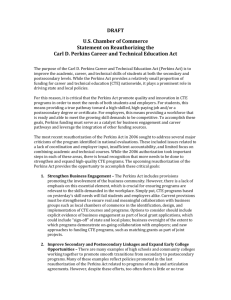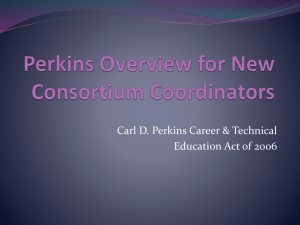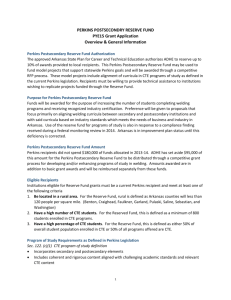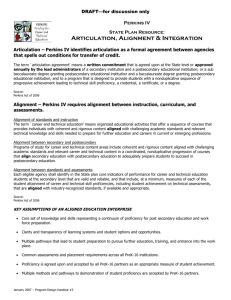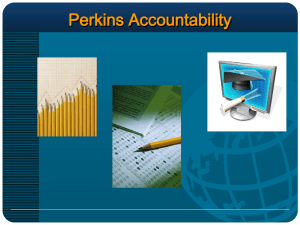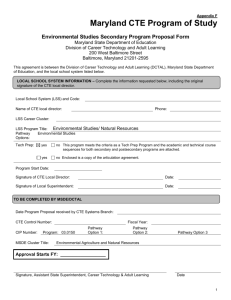Creating Secondary/Postsecondary Programs of Study
advertisement
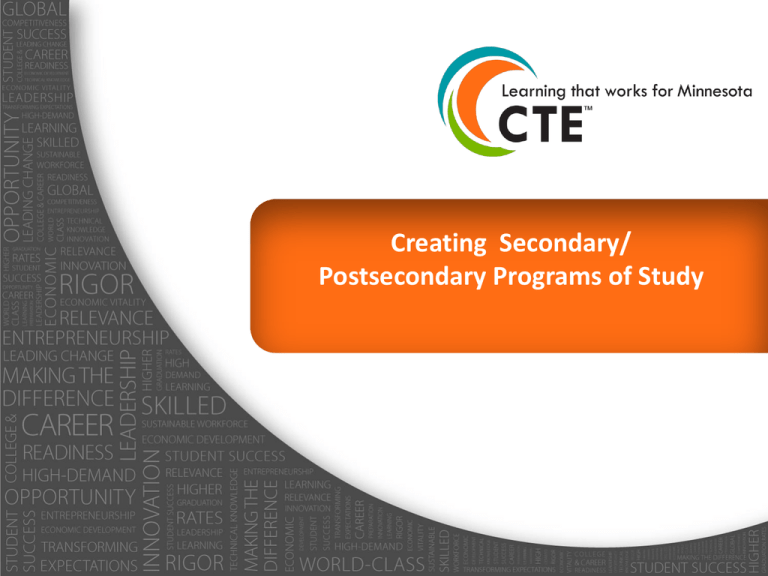
Creating Secondary/ Postsecondary Programs of Study Perkins IV & Programs of Study • Incorporate and align secondary and postsecondary education elements, • Include academic and CTE content in a coordinated, nonduplicative progression of courses, • Offer the opportunity, where appropriate, for secondary students to acquire postsecondary credits, and • Lead to an industry-recognized credential or certificate at the postsecondary level, or an associate or baccalaureate degree. COLLEGE & CAREER READINESS FOR ALL STUDENTS!! 2 POS Framework Supporting Elements Perkins POS Required Elements Incorporate and align secondary and postsecondary education elements • • Include academic and CTE content in a coordinated, non-duplicative progression of courses • Course sequences • College and career readiness standards • Teaching and learning strategies • Guidance counseling and academic advisement Offer the opportunity, where appropriate, for secondary students to acquire post-secondary credits • • Credit transfer agreement Professional development Lead to an industry-recognized credential or certificate, Associate or Baccalaureate degree • • Technical skills assessment Accountability and evaluation systems Legislation and policies Partnerships Minnesota’s response… Three important changes in the implementation of Perkins Act of 2006 • MN changed its definition of a local recipient. • A requirement for the establishment of Programs of Study • A new approach to assessing CTE skills Academic (Liberal Arts & Sciences) skills Technical skills Workplace skills Minnesota only awards Perkins funds to collaborating consortia of secondary and postsecondary schools…no individual local recipients. Minnesota’s Career Wheel Minnesota Program of Study Set of aligned programs and curricula that begin at the high school level and continue through college and university certificate, diploma, and degree programs. • Career Fields • Career Clusters • Career Pathways The stakeholders • Perkins consortia leaders • Local education administrators • Teachers and faculty • Business and industry leaders • State CTE staff • Legislative leaders The process • Based on labor market information, identify the HIGH SKILLS, HIGH WAGE, AND/OR HIGH DEMAND OCCUPATIONS in region . • Identify KEY STAKEHOLDERS to be involve by pathway process. • Begin the discussion on RECOMMENDED ACADEMIC (or liberal arts & sciences) and CTE COURSES in secondary and postsecondary programs. • Identify certificate, diploma, and degreed PROGRAMS AT POSTSECONDARY LEVEL. • Involve business & industry reps through advisory committees in a process of VALIDATION OF THE WORK. • Use as a GUIDANCE COUNSELING TOOL with students and parents. NEW!!! MnProgramsofStudy/ ISEEK http://www.mnprogramsofstudy.org Benefits of MnProgramofStudy.org Use MnProgramofStudy.org. . . • as a counseling tool • for career development instruction • for course schedule planning • to discuss high school to college/ career options Technical Skill Assessment Project www.cte.mnscu.edu/programs/mntsa.html Academic Year 79 Career Pathways Addressed in TSA Project 2010-2011 • • • Accounting Law Enforcement Services Network Systems • • Plant Systems Therapeutic Services 2011-2012 • • • • • • Animal Systems Diagnostic Services Early Childhood Development & Services Teaching/Training (Pre K-3) Engineering & Technology Facility & Mobile Equipment Maintenance • • • • • • Marketing Management, Merchandising Professional Sales Printing Technology Visual Arts/ Foundation Knowledge & Skills 2012-2013 • • • • • • • • Administrative Support Administration and Administrative Support Services Construction Emergency & Fire Management Environmental Services Systems Natural Resource Systems Web & Digital Communications Health Informatics • • • • • • • • Health Informatics Personal Care Services Production Mfg Production Process Development Restaurant Food & Beverage Services Teaching/Training (K-12) Professional Support Services 2013-2014 • • • • • • • • • • • • Agribusiness Systems Audio/Video Technology & Film Biotechnology Research & Development Business Information Management Correction Services Counseling & Mental Health Services Family & Community Services Foreign Service Governance Design/Pre-construction General Management Human Resource Management • • • • • • • • • • • • Information Support & Services Journalism & Broadcasting Operations Management Maintenance Installation & Repair Planning Performing Arts Power, Structural, and Technical Systems Public Management & Administrative Planning National Security Revenue & Taxation Security & Protective Services Telecommunications 2014-2015 • • • • • • • • • • Banking Services Business Finance Consumer Services Food Products & Processing Systems Health Support Services Transportation Systems, Infrastructure Health Safety & Environmental Management Insurance Legal Services Lodging, Travel, & Tourism • • • • • • • • • • Marketing Communications Marketing Research Programming & Software Development Quality Assurance Recreation, Amusement and Attractions Regulation Sales & Services Securities & Investment Science & Mathematics Telecommunications Common Core Competencies for Secondary/ Postsecondary Programs in Each Career Pathway State Approved Technical Skill Assessments by Career Pathway Minnesota Career Technical Education Data Driven Improvement Professional Development • CTEDDI provides teachers & faculty professional development to increase their confidence, knowledge and skills in Programs of Study and technical skill assessments. • CTEDDI will be delivered by facilitators who will also serve as coaches as the educators apply their initial training at their school sites. Next Steps - Discussion Think about your own local progress in implementing effective Programs of Study • Strengths? • Needs for improvement? How can the your state or local CTE leaders assist you in your work on this initiative? Resources • www.cte.mnscu.edu • www.careertech.org • www.mnprogramsofstudy.org
